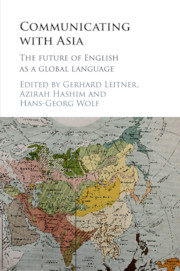Book contents
- Communicating with Asia
- Communicating with Asia
- Copyright page
- Contents
- Figures
- Tables
- Contributors
- Book part
- Communicating with Asia: introduction
- Part I English in selected regional and national habitats with a glance at the role of outward-bound communication needs
- Part II Major other languages in Asia, their international status and impact on education
- Part III Wider perspectives
- 16 Understanding Asia by means of cognitive sociolinguistics and cultural linguistics – the example of ghosts in Hong Kong English
- 17 Understanding Asia through English literature
- 18 English as a lingua franca and educational impact in Asia
- 19 The Australian Asia project
- Bibliography
- Index
16 - Understanding Asia by means of cognitive sociolinguistics and cultural linguistics – the example of ghosts in Hong Kong English
from Part III - Wider perspectives
Published online by Cambridge University Press: 05 January 2016
- Communicating with Asia
- Communicating with Asia
- Copyright page
- Contents
- Figures
- Tables
- Contributors
- Book part
- Communicating with Asia: introduction
- Part I English in selected regional and national habitats with a glance at the role of outward-bound communication needs
- Part II Major other languages in Asia, their international status and impact on education
- Part III Wider perspectives
- 16 Understanding Asia by means of cognitive sociolinguistics and cultural linguistics – the example of ghosts in Hong Kong English
- 17 Understanding Asia through English literature
- 18 English as a lingua franca and educational impact in Asia
- 19 The Australian Asia project
- Bibliography
- Index
Summary
This chapter argues that ‘communicating with Asia’ requires intercultural competence. Such competence will not only imply awareness but also understanding of cultural differences. Traditional descriptivist approaches in sociolinguistics, arguably, do not or only insufficiently capture this cultural dimension. Using Hong Kong English as an example, the chapter will attempt to show how the newly emerging paradigms of Cognitive Sociolinguistics and Cultural Linguistics can contribute to a more comprehensive linguistic description and hence to intercultural understanding. The chapter will be divided into three parts: The first part will stress the hermeneutic nature of intercultural communication in English. The second part will demonstrate how cultural patterns expressed in Hong Kong English − specifically conceptualizations pertaining to ghosts1 and related concepts – can be systematically elicited and analyzed. The third part will introduce a concrete lexicographic application of the insights discussed in the preceding parts, as realized in A Dictionary of Hong Kong English (Cummings and Wolf 2011).
- Type
- Chapter
- Information
- Communicating with AsiaThe Future of English as a Global Language, pp. 249 - 266Publisher: Cambridge University PressPrint publication year: 2016
- 14
- Cited by

